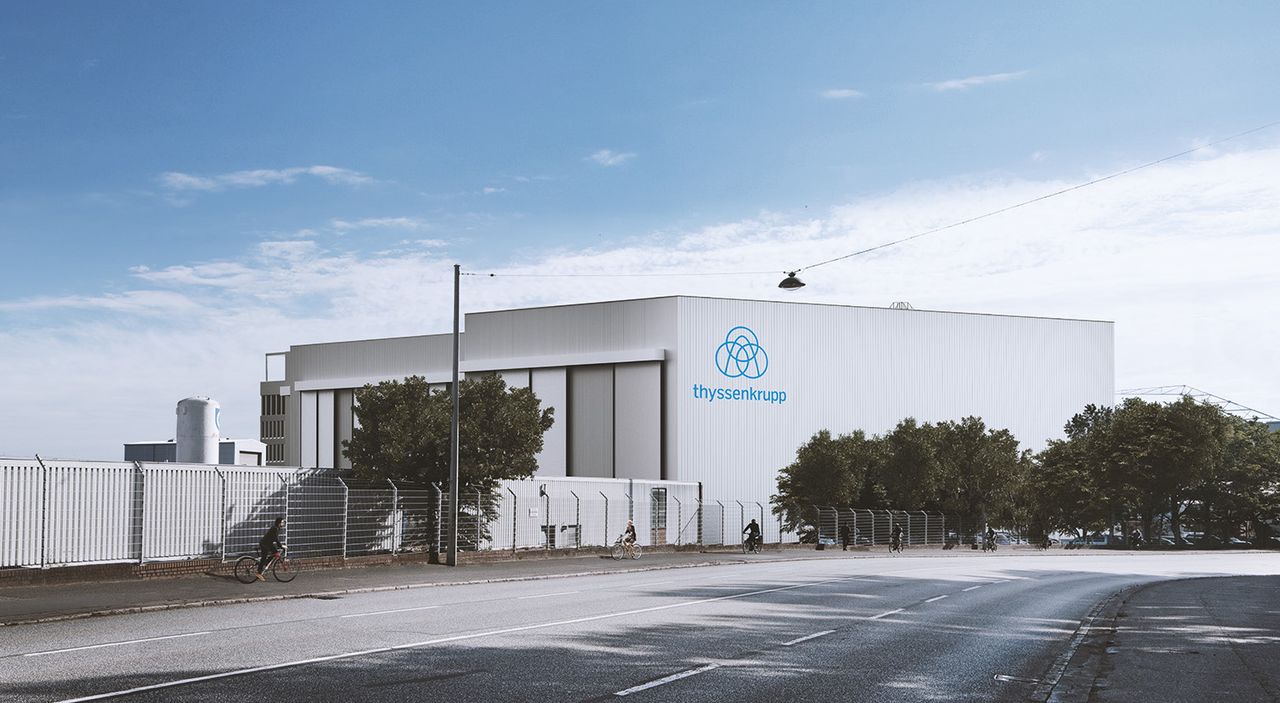
Promoting environmental and climate protection measures in processes, products, and projects is of major importance at thyssenkrupp Marine Systems. The environmental impact of production and products is considered over the entire lifecycle through to disposal or recycling.
Products have always been developed and built with the efficient and effective utilization of resources in mind. Research and development help us increase energy efficiency further. Production processes are constantly being optimized to see how CO2 emissions can be reduced further. This also includes environmentally friendly energy and heat supply. The aim is to reduce the carbon footprint by 30% with regard to scope 1 and 2 emissions and by 16% with regard to scope 3 emissions by 2030.
Energy management & sources of energy
Energy management is one of our most powerful tools for tackling climate change and acting responsibly with the given energy sources. This is why all main production sites of thyssenkrupp Marine Systems and ATLAS ELEKTRONIK GmbH have ISO 50001-certified energy management systems.
We focus on continually improving energy performance for the scope of electrical power and heating consumption. thyssenkrupp Marine Systems implements direct and immediate energy management actions and relies on a long-term energy strategy. Measuring infrastructure to control, evaluate, and derive data results in improvements on a regular basis and guarantees transparency in energy consumption. At our complex manufacturing sites, this infrastructure can comprise more than 500 measuring points. In recent years (2018 to 2021), we have saved a large amount of electrical energy – no less than 6,000 MWh.
When purchasing energy, we are increasingly focusing on using renewable energy sources wherever possible. 100% of the electricity purchased at our own production sites comes from renewable energy sources. At our leased sites, we are dependent on agreements with the owners.
Waste management
Avoiding waste conserves resources and protects people and the environment. Therefore, the first principle is waste avoidance. In the second step, waste recycling always has priority over disposal. Precise working methods, optimized processes for obtaining components from a raw material, or the conscious use of commodities such as paper or packaging materials help avoid waste from the very beginning. However, for a shipbuilding company, avoiding waste is a huge challenge and must not be pursued at the expense of quality, products, or occupational health and safety. thyssenkrupp Marine Systems’ products are designed for long durability. Furthermore, the company provides services for refitting and modernizing existing vessels to extend the products’ life cycles even further.
The separation of waste determines the further procedure and the life cycle of the waste. The company attaches great importance to the proper separation and delivery of waste materials to the disposal companies. Achieving this involved continual training on proper waste disposal for employees, providing different types of waste containers, inspecting waste containers, and monitoring waste types. Each waste container removed from the shipyard is documented. Several measures at all sites support the reduction of waste in daily routines, such as in the canteen or the offices. In total, 90% of the waste produced within the business unit is recovered and recycled, including thermal recycling.
Management of water resources
Industrial water management is an important principle for protecting the environment, nature, and the local population. We aim to utilize water resources as efficiently as possible with the help of technical and structural measures and processes.
Furthermore, sustainable water management avoids water contamination and thus protects the environment from water hazards caused by hazardous substances used in production. We attach great importance to categorizing the substances used in the company according to their hazard class and ensure that these water-polluting substances are handled appropriately. We carefully assess the impact of wastewater discharge in compliance with applicable laws and regulations. Internal audits and local authorities regularly check whether the safety precautions at the sites comply with the guidelines and specifications.
Sustainable technologies
Innovative power and sound technological knowledge are core strengths of thyssenkrupp Marine Systems. Offering sustainable and innovative products and services is a key success factor for our growth. We focus our activities related to our core maritime technologies on climate protection, energy transition, mobility of the future, and digital transformation.
The global research and development (R&D) network from thyssenkrupp includes 75 sites with some 3,600 employees. It is augmented by collaborations with external partners such as universities, research institutes, and other industrial enterprises. As of 2024, the patent portfolio of thyssenkrupp Marine Systems contains over 3,000 patents and utility models. The trademark portfolio comprises more than 750 property rights. This network's innovative power offers various sustainable solutions for its products, and knowledge for joint activities.
The commitment to environmental protection is strong – as demonstrated by the growth of related innovation activities in dedicated areas. Furthermore, a concept for the disposal of unexploded explosive ordnance has been developed since 2021, and implementation is continuously discussed with federal institutions. The legacy of the wars on the European continent in the 20th century remains. Unexploded ordnance (such as bombs, grenades, and naval mines) is scattered in Europe’s coastal waters to an unbelievable extent. In fact, there are at least 1.6 million tons of munition from the World Wars in the North and Baltic Sea, 300,000 tons of which are in the Baltic Sea alone. thyssenkrupp Marine Systems has the expertise, willingness, and technology to clean our oceans and make them a safer place.




